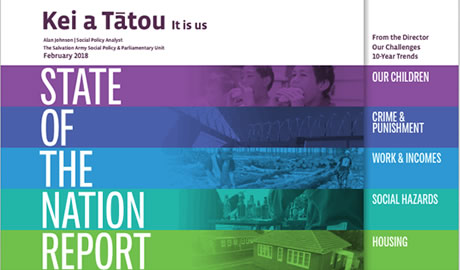The Salvation Army says drugs, crime and poverty mar its latest state of the nation report.
It says despite the country becoming wealthier, many Kiwis don’t share the prosperity.
The Salvation Army says the number of families seeking food parcels from its 65 food banks jumped 12 percent this year.
It says demand had held steady for five years before this increase.
The Salvation Army calls the report Kei a Tatou, It is us.
It monitors progress in 25 areas and measures the past decade’s social and economic equality.
New Zealand did well between 2013 and 2017 as a result of the economy growing by 14 percent.
The number of jobs grew 15 percent and per-capita GDP grew 13 percent, adjusted for inflation.
But the report finds that there was no big change in child poverty rates. Youth unemployment stayed around 20 percent.
The report’s author, Alan Johnson, says everyone isn’t sharing the strong economic growth.
He says there has been “frightening” rise in the number of families falling into food poverty.
“That’s the true cost of rent rises and slow wage growth on our most vulnerable families,” he says.
The people behind the figures
The Salvation Army’s Social Policy & Parliamentary Unit’s director urged the report’s readers to remember it’s about people.
Lt. Colonel Ian Hutson says, “Behind these statistics are people … sometimes thriving … while on other occasions they are isolated, living with extreme levels of stress, in poverty and highly marginal.”
He says New Zealand can’t separate its poorest people while pretending they don’t matter.
While the report describes a desperate situation, it did hold positive signs.
It shows New Zealand is closing educational achievement gaps.
It is increasing participation in early childhood education.
There are reductions in infant mortality, teenage pregnancy and youth suicide.
The report found economic growth had not led to fewer children in poverty and furthermore it didn’t reduce the number of young people without meaningful work.
Methamphetamine-related offences grew by 80 per cent in the past three years.
It found that government policies caused the prison population to surge to record levels. This despite a consistent drop in crime.
Sources:
Image credit:
- Salvation Army
